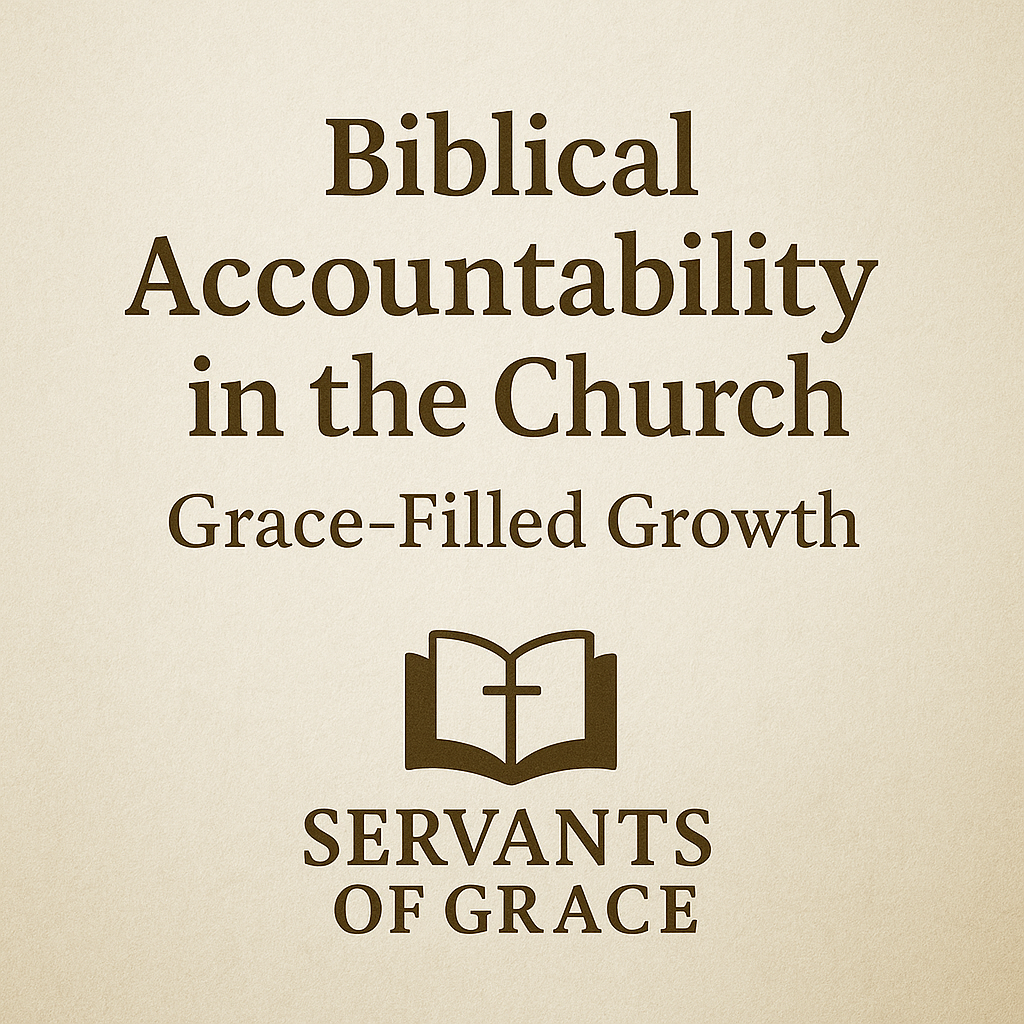⏱️ Estimated Reading Time: 8 min read
Summary:
In a world that often confuses accountability with shame or control, biblical accountability offers something radically different: grace-filled, gospel-rooted care. This article explores how biblical accountability in the local church fosters spiritual growth, real friendship, pastoral oversight, and healing—especially for the wounded.
Dear Christian,
One of the greatest gifts God gives us for our spiritual growth is gospel-rooted, heart-to-heart accountability within the local church. In a culture that often mistakes accountability for judgment or authoritarianism, many Christians shy away from the very relationships God intends for our sanctification and joy.
But true, biblical accountability is not about a finger in the face—it’s about an arm around the shoulder. It’s not driven by guilt, but by grace. It doesn’t end with correction (it might involve that) but moves us toward Christ with one another (Romans 15:14; Galatians 6:1–2).
The Theological Vision Behind Accountability
Accountability is not just a relational strategy—it’s a biblical mandate grounded in rich theological truths. It flows from our union with Christ (Galatians 2:20), our shared identity as members of His body (1 Corinthians 12:12–27), and the role of the local church as the God-ordained context for growth in godliness (Ephesians 4:11–16). The New Testament teaches a relational, covenantal community where believers help one another persevere (Hebrews 3:12–14), correct one another in love (Matthew 18:15–17), and point each other back to the gospel.
“Therefore, encourage one another and build one another up, just as you are doing.” —1 Thessalonians 5:11
We were never meant to grow alone. The Lord sanctifies us in community through truth-filled conversations, mutual encouragement, and honest correction—all of which require biblical accountability (Proverbs 27:17).
The Beauty of Biblical Accountability
Biblical accountability is a mutual commitment to help one another follow Jesus in daily life. It’s expressed through honest confession, loving correction, patient listening, and Spirit-empowered encouragement. It happens in friendships marked by grace and truth, where we speak openly about sin, celebrate obedience, and restore the wandering brother or sister in gentleness (Galatians 6:1–2).
In the church, pastors protect and guide the flock, not by lording authority, but by shepherding with Christlike humility (1 Peter 5:1–3). Discipleship relationships become fertile ground for spiritual growth when the Word of God is central and conversations are saturated with gospel hope. Even church discipline, rightly practiced, serves as a restorative expression of love (Matthew 18:15–17).
Accountability is not a program; it’s a pattern of life built on God’s Word and carried out through genuine relationships in the body of Christ (Colossians 3:16).
What Real Friendship Looks Like in the Church
True Christian friendship is more than surface-level connection—it is spiritual companionship that walks through every season with eternity in view. Friends in the church speak truth in love (Ephesians 4:15), carry each other’s burdens (Galatians 6:2), and stand together in both joy and sorrow (Romans 12:15).
Daily encouragement, heartfelt prayer, and honest conversations form the rhythms of biblical friendship (Hebrews 3:13; James 5:16). These relationships are forged in worship, deepened over shared meals, and strengthened through mutual discipleship (Acts 2:46–47). They are the context where accountability can thrive.
For Pastors and Ministry Leaders
Pastors are called not only to preach the Word, but to live it among the people they shepherd. Biblical accountability for pastors means modeling humility, practicing repentance, and seeking feedback from fellow elders and mature members of the congregation. This kind of leadership creates a culture where trust grows and accountability becomes a joy rather than a burden.
Rather than managing the church from a distance, faithful shepherds walk closely with their people, making themselves approachable and teachable. As under-shepherds of Christ, they lead not by domination, but by example—cultivating communities that value grace, truth, and gospel-centered relationships (Philippians 2:3–5; Titus 2:7–8).
For Church Members
Accountability is not something reserved for leaders. Every member of the body of Christ plays a vital role in helping others grow in grace. That begins with committing to a local church—not just attending, but engaging. Show up, serve, and be known.
Speak words that build others up (Ephesians 4:29). Don’t avoid hard conversations—embrace them in love. Open your life to trusted brothers and sisters who will walk with you, speak honestly to you, and pray faithfully for you. This kind of mutual care reflects the heart of God and deepens the unity of the church (Romans 15:14; Hebrews 10:25).
For Biblical Counselors
Biblical counseling is not an isolated ministry—it thrives in the context of the local church. Counselors serve best when they partner closely with church leadership, encourage integration into the life of the body, and ground their care in the sufficiency of Scripture.
Good counseling doesn’t just aim at behavior modification; it aims at heart transformation through the gospel. It reinforces the value of ongoing accountability and points people back into life-giving relationships within the church. Counseling, then, becomes a bridge back to community—not a substitute for it (Galatians 6:1–2; Romans 12:1–2).
For Those Wounded by Misused Accountability
Some of you reading this have been hurt by distorted forms of accountability—perhaps through heavy-handed leadership, public shaming, or manipulative control. If that’s you, hear this clearly: Jesus does not wound His sheep. He is gentle and lowly in heart (Matthew 11:28–30), and He binds up the broken (Isaiah 42:3).
Real accountability reflects His heart. It doesn’t shame—it restores. It doesn’t punish—it corrects in love. If you’ve been spiritually hurt, seek out a healthy, gospel-centered church where grace and truth are practiced in harmony. Healing takes time, but Christ is faithful to walk with you in it (Romans 12:9–10).
Practical Ways to Cultivate Gospel Accountability
The best way to foster accountability is to start with intentional relationships. Join a small group or discipleship gathering where the Word is central and relationships run deep. Pursue a mature believer who can walk with you in regular conversation, prayer, and Scripture reading.
Let God’s Word be your foundation (2 Timothy 3:16–17). Ask thoughtful questions. Welcome correction. And be consistent in prayer and presence. Accountability is not about perfection—it’s about progress. It’s about taking the next faithful step toward Christ in community (Proverbs 27:17; Philippians 4:6).
Questions Christians Often Ask About Accountability
Many believers carry misconceptions or painful memories related to the idea of accountability. Some ask, “Isn’t accountability just another word for control?” The biblical answer is no. True accountability is rooted in grace, not coercion. It’s a mutual effort to walk in the light together for the glory of God and the good of our souls (Galatians 6:1–2).
Others wonder, “What if I’ve been hurt by it in the past?” That’s a real and heartbreaking reality. Misused accountability can leave wounds. But when done rightly—under Christ’s lordship and in the context of a healthy church—it restores, heals, and builds up. If you’ve been wounded, you don’t need to rush back in. Take time. But don’t give up on what Scripture commends.
Some ask, “Can’t I just be accountable to God?” Of course, our ultimate accountability is always to the Lord. But Scripture makes it clear that we grow best in community. Hebrews 10:24–25 calls us not to neglect meeting together, but to stir one another up to love and good works.
Another concern: “Do pastors really need accountability too?” Absolutely. No one is above correction. Faithful shepherds model what it looks like to live in the light and walk in humility. Their example sets the tone for the entire church (1 Peter 5:1–4).
Finally, the question, “Where do I start?” You start small. Find one faithful person. Begin to meet. Share. Pray. Build trust. You don’t need a program—you need people willing to walk in grace and truth with you.
Further Resources
Questions Christians Often Ask About Accountability
Question: Is accountability just another word for control?
Answer: Not at all. True biblical accountability is rooted in grace and truth, not coercion or dominance. It’s a mutual effort to walk in the light for the glory of God and the good of one another (Galatians 6:1–2).
Question: What if I’ve been hurt by accountability in the past?
Answer: That’s a real and painful experience for many. Misused accountability wounds—but when done rightly, under Christ’s lordship and in a gospel-centered church, it brings healing, restoration, and joy (Isaiah 42:3; Matthew 11:28–30).
Question: Can’t I just be accountable to God?
Answer: Our ultimate accountability is to the Lord, but God designed the church as the place where we grow together. Hebrews 10:24–25 teaches us not to neglect meeting together but to stir one another up to love and good works.
Question: Do pastors really need accountability too?
Answer: Absolutely. No one is above correction. Faithful shepherds model humility and repentance. Their example builds trust and health in the church (1 Peter 5:1–4).
Question: Where do I start with accountability?
Answer: Start small. Find one trusted person who loves Jesus and His Word. Begin meeting. Share. Pray. Walk together in grace and truth. You don’t need a program—you need people (Proverbs 27:17).
Dave Jenkins is happily married to his wife, Sarah. He is a writer, editor, and speaker living in beautiful Southern Oregon. Dave is a lover of Christ, His people, the Church, and sound theology. He serves as the Executive Director of Servants of Grace Ministries, the Executive Editor of Theology for Life Magazine, the Host and Producer of Equipping You in Grace Podcast, and is a contributor to and producer of Contending for the Word. He is the author of The Word Explored: The Problem of Biblical Illiteracy and What To Do About It (House to House, 2021), The Word Matters: Defending Biblical Authority Against the Spirit of the Age (G3 Press, 2022), and Contentment: The Journey of a Lifetime (Theology for Life, 2024). You can find him on Facebook, Twitter, Instagram, Youtube, or read his newsletter. Dave loves to spend time with his wife, going to movies, eating at a nice restaurant, or going out for a round of golf with a good friend. He is also a voracious reader, in particular of Reformed theology, and the Puritans. You will often find him when he’s not busy with ministry reading a pile of the latest books from a wide variety of Christian publishers. Dave received his M.A.R. and M.Div through Liberty Baptist Theological Seminary.




